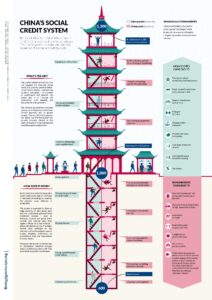China’s social credit system isn’t a world first but it is unique.

Pic courtesy:https://www.bertelsmann-stiftung.de/fileadmin/files/aam/Asia-Book_A_03_China_Social_Credit_System.pdf
The Social Credit System is part of Xi Jinping’s vision for data-driven governance.
The goal of the China social credit system is to provide a holistic assessment of an individual or a company’s trustworthiness.
The China social credit system, is an extension of existing social rankings and ratings in China which have existed for millennia.
The Social Score is a system that collects all kinds of data about citizens and companies, sorts, analyses, evaluates, interprets and implements actions based on it.
In concrete terms, this means that if you wait at a red light, you get plus points. If you pay your taxes and bills on time, you get plus points. If you are socially involved and accept the rules, you also get plus points.
If you have a good Social Score, you get unsolicited benefits for your social behaviour. These include, for example, faster visa application processing and more freedom to travel. When dating online, algorithms higher prioritize the own profile. Banks offer lower interest rates for company loans or private real estate purchases. People with a high Social Score are promoted faster and get better job offers.
However, people who go red, cut off someone while driving, spit on the street or stick their chewing gum under their seat get minus points.
Anyone who criticizes the state in social media or pays their bills too late also receives minus points.
The consequences of a poor social credit score could be serious. It may affect travel prospects, employment, access to finance, and the ability to enter into contracts. On the other hand, a positive credit score could make a range of business transactions for individuals and corporations much easier.
It is essential that any foreign business consolidating or establishing their presence in China seek professional advice for managing a social credit score. This applies both to individual scores, and the corporate social credit score.
Machine (AI) based Implementation
Every country has laws, cultural norms, social morals and social agreements. The police, courts, politicians, administrations, media and citizens are involved in a constant dialogue; it determines what we define as right or wrong.
In China, this task has partly been taken over by Artificial Intelligence based machine i.e. controlling and managing the society – with machines instead of people. The machine decides on correct and incorrect behaviour.
Inputs are obtained from:
- Financial Data
- Digital Data (Internet websites, apps, videos and pictures visited/browsed)
- Mobile Data (Calls and messages)
- Health Data
The data is used to make individual profiles (Behaviour, movement and content).
Based on the profile credit scores are allotted and reviewed.
Based on the credit score the privileges are granted or curbed.
Ethical Issues
This system raises a lot of ethical questions related to freedom and privacy.
- Who monitors the score, who imports the data and who configures the system?
- How ethical and moral aspects (if any) are integrated?
- Who monitors the system to prevent manipulation, and abuse of power?
- What data is collected? Who has access to it?
- How is the privacy of citizens and companies ensured?
- Are only Chinese citizens monitored or all people on Chinese territory?
- Does the government also collect data on Chinese people abroad?
End piece
Collecting data and setting up administrative systems to ensure protection, freedom and security for all concerned is a legitimate tool for states. However, as surveillance increases, privacy must be respected as long as the welfare of society is not affected.
Titbits
In China everyone’s movements are monitored continuously. In the AI based monitoring system besides face recognition, even gait recognition has been introduced to make it more fool proof.
Question
Do you approve of such a system?
Suggestions and value additions are most welcome
For regular updates, please register here
References
https://www.wired.co.uk/article/china-social-credit-system-explained
https://merics.org/en/report/chinas-social-credit-system-2021-fragmentation-towards-integration
https://nhglobalpartners.com/china-social-credit-system-explained/
